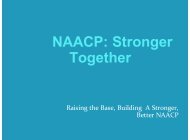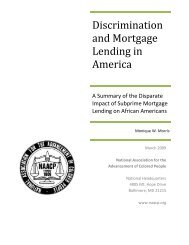TOOLKIT
TOOLKIT
TOOLKIT
Create successful ePaper yourself
Turn your PDF publications into a flip-book with our unique Google optimized e-Paper software.
Sample Agenda<br />
Title: Environmental and Climate Justice and YOU!<br />
Date, time, location: Monday, October 15, 2012, 2-4pm, Multipurpose Room<br />
1:30 pm Registration and sign in<br />
2:00 pm Welcome and Introduction of the topic<br />
2:30 pm Keynote speaker – presentation with visuals (power point or otherwise)<br />
3:15 pm Group activity, get the participants to work together in small groups to share<br />
ideas, comments, concerns.<br />
3:45 pm Share the group findings and additional comments<br />
4:00 pm Adjourn<br />
Sample Panelist Agenda:<br />
Title: Environmental and Climate Justice and YOU!<br />
Date, time, location: Monday, October 15, 2012, 2-5pm<br />
1:30 pm Registration and sign in<br />
2:00 pm Welcome and Introduction of the topic<br />
2:30 pm Introduction of the panelists (15-20 minutes for each panelist)<br />
3:30 pm Questions<br />
4:00 pm Group activity, get the participants to work together in small groups to share<br />
ideas, comments, concerns.<br />
4:45 pm Share the group findings<br />
5:00 pm Adjourn<br />
Remember to provide light refreshments such as water, tea, healthy snacks if possible through<br />
funding.<br />
How to format a Panel Discussion:<br />
A panel discussion is a formal, moderated discussion between selected speakers on a specific<br />
topic, in front of an audience. A successful panel discussion will follow a set agenda, specifically<br />
a set order of specific events. Keeping to this order and adhering to time limits will make a panel<br />
discussion organized and professional. Distributing the agenda ahead of time to panel members<br />
and audience participants will assist the moderator in keeping all participants focused.<br />
1. Targeted Opening: The moderator should introduce the topic in a focused and concise<br />
way, designed to grab the audience's attention. The moderator can use an anecdote or<br />
example from current media to hone in on the main points of the coming discussion.<br />
2. Introduction of Panelists<br />
3. Questions for Panelists: A few questions should be drafted by the moderator prior to the<br />
event to frame the dialogue of the session.<br />
4. Panelist Closing Remarks<br />
5. Question and Answer<br />
6. Thank the panelists and the audience<br />
60 | P a g e








